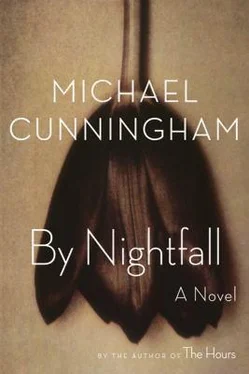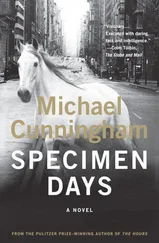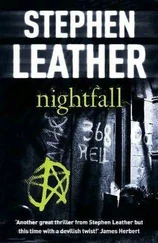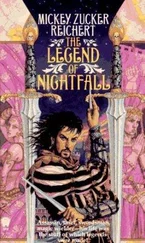Peter says to Mizzy, “There’s not really much I can do with a statement like that.”
And by the way, what if Rebecca should come out of the bedroom right now? You understand, don’t you, that my only option would be to tell her everything. And that it would look weird, you standing out here naked like this, no matter what I told her.
Didn’t Rebecca once say, I suspect Mizzy is capable of just about anything? Didn’t she say it with a certain combination of anger and reverence?
“I know,” Mizzy answers. “Okay.”
Okay?
Mizzy places his fingertips on either side of his jawbone. Churchly. The young seeker come to proclaim his unworthiness.
He says, “I feel like I’m starting to see the world just… go along without me. And, you know, why shouldn’t it? But I don’t have. Any idea about what to do. I’ve thought for so long that if I just said no to all the, you know, obviously bad ideas, like law school, that the good idea would just sort of come along. And I begin to see that this is how sad old failures get their start. I mean, first you’re a cute young failure, and then…”
He laughs, a long, low sob of a laugh.
Peter says, “Despair seems premature.”
“I know. I do know. But this is a bad time for me. I fell into, I don’t know, some kind of pit up there in that shrine, it was exactly what wasn’t supposed to happen. I… felt like I began to see the transitory nature of all things, the serene absence in the middle of the world, but it wasn’t comforting. It made me want to kill myself.”
Again, a strain of the sob-laugh.
“That would be overreacting,” Peter says. Fuck, there it is again, that desire to be tough but compassionate that comes out sounding flip and callous.
“Don’t let me get melodramatic,” Mizzy says. “Here’s what I’m trying to say. I’m walking a line. I can’t tell myself that what I need is to go to a better shrine, or a shrine in a different country. I’m out of illusions. I need a little help getting through right now. I’m not proud of it. If I can feel okay for a little while, if I can get out of bed and get moving in the mornings, if you can possibly help me get started on a job, I’ll quit. I’ve quit before. It’s something I know I can do.”
“You’re putting me in an impossible position.”
“I’m asking you for a little help. I know, I know, but it’s too late to change that, and really, really and truly, I need a couple of months. I need a couple months of feeling okay, so I can start a life. And, well. You know what’ll happen if you tell Rebecca.”
He does.
“Will you promise not to have it delivered here anymore?” he says.
“Absolutely.”
Yeah, right.
“I’m not saying yes. I’m saying I’ll think about it.”
“That’s all I need. Thank you.”
With that he leans over and kisses Peter, gently, at least semichastely, on the lips.
Whoa.
Mizzy pulls back, offers a charmingly abashed smile that has to have been practiced over the years.
“Sorry,” he says. “My friends and I all kiss each other, I don’t mean anything by it.”
“Got you.”
And yet. Is Mizzy offering himself?
Peter takes the Stoli bottle out of the freezer, pours them each a shot. What the hell. Then he goes to the bathroom for the Klonopin. Mizzy knows to wait in the kitchen. When Peter returns, with a little blue pill for each of them, they say “Chin chin” and down the pills with the vodka.
There is something exciting about this. Peter still doesn’t want to have sex with Mizzy, but there is something thrilling about downing a shot of vodka with another man who happens to be naked. There’s the covert brotherliness of it, a locker-room aspect, the low, masculine, eroticized love-hum that’s not so much about the flesh as it is about the commonality. You, Peter, as devoted as you are to your wife, as completely as you understand her very real worries on Mizzy’s behalf, also understand Mizzy’s desire to make his own way, to avoid that maelstrom of womanly ardor, that distinctly feminine sense that you will be healed, whether you want to be or not.
Men are united in their commonness, maybe it’s as simple as that.
And, okay, for a moment, a moment, Peter imagines that he, too, could be a Rodin, not, of course, the boy of the Bronze Age but not a Burgher of Calais either; he could be an undiscovered Rodin, the aging but unbowed, a figure of stern dignity, standing foursquare, weaponless, bare-chested (his chest is still muscular, his belly not bad), with a drape around his loins, as befits a gentleman of years (who’s not crazy about the condition of his ass).
“Thanks again,” Mizzy says. “For thinking about it.”
“Mm.”
“Night.”
“Good night.”
Mizzy returns to his room. Peter watches him go, his supple back and the small, perfect spheres of his ass. Whatever’s gay in Peter is probably mostly about ass, the place where another man is most vulnerable, childlike; the place where his physiognomy seems least built for a fight.
Go ahead. Say it silently, inside your mind. Nice ass, little brother.
And now, poor creature, to bed.
Sleep, however, will not return. After a full hour he gets out of bed, gropes for his clothes. Rebecca stirs.
“Peter?”
“Shh. Everything’s okay.”
“What are you doing?”
“I feel better.”
“Really?”
“It must have been food poisoning. I’m suddenly okay again.”
“Come back to bed.”
“I just want some air. Back in ten minutes.”
“Are you sure?”
“Yeah.”
He leans over, kisses her, inhales the sleepy, sweet-sweaty smell she emanates.
“Don’t go for long.”
“I won’t.”
Again, the ice pick in the chest. Someone who worries over you, tends to you, and for whom you do the same… Don’t couples live longer than single people, because they’re better cared for? Didn’t somebody do a study?
He’s eavesdropped on his wife’s brother as he whacked off, there’s probably no way to tell her that, ever, is there?
He does have to tell her that the precious little brother is using again. How and when does he do that?
Dressed, he steps out into the semidark of the big room. There’s no line of light under the door to Mizzy’s room.
Time to go out, just out, into the nocturnal world.
And here he is, letting the massive steel street door click shut behind him, standing at the top of the three iron steps that lead down to the shattered sidewalk. New York is probably, in this regard at least, the strangest city in the world, so many of its denizens living as they (we) do among the unreconstructed remnants of nineteenth-century sweatshops and tenements, the streets potholed and buckling while right over there, around the corner, is a Chanel boutique. We go shopping amid the rubble, like the world’s richest, best-dressed refugees.
Mercer Street is empty late at night. Peter turns uptown, then heads east on Prince, toward Broadway, going nowhere in particular but generally toward the more raucous, younger part of downtown, away from the filtered Jamesian slumber of the West Village. He’s aware of his own reflection skating silently alongside him in the dark windows of closed shops. The semiquiet of Prince Street holds for less than a block and then he’s crossing Broadway, which, of course, is never quiet, though this particular stretch is a Blade Runner strip mall, with its mammoth suburban chain stores, its Navy and Banana and Etcetera, which have reproduced themselves as perfectly here as they would anywhere, though here they display their wares to an endless riot of horn-blasting traffic; here their doorways are makeshift nocturnal homes that the resident sleepers have rigged up out of cardboard and blankets. Peter waits for the light, crosses among a small congregation of those nighttime pedestrians of lower Broadway, the couples and quartets (they’re always paired) who are neither old nor young, who are clearly prosperous, who are Out for the Night and seem to be having a good-enough time, having driven in, he supposes, from somewhere nearby, parked in a public garage, had dinner, and are now headed… where? To retrieve their cars, to go home. Where else? These are not people with inscrutable assignations. They’re not tourists, either, they’re nothing like the gawkers and brayers in a place like Times Square, but they don’t live here, they live in Jersey or Westchester, they’re burghers right out of seventeenth-century Amsterdam, they cross Broadway as if they fucking own it, they think they look rakish, they think they’re creatures of the night, they have neighbors whom they consider burghers because they don’t like driving in New York, because they’d rather stay home (right now, the woman in the fringed pashmina shawl, the one walking arm-in-arm with Cowboy Boots, explodes in laughter, a great smacking hoot of a laugh, a three-martinis laugh, audible for a block or so), while the residents of downtown Manhattan, the ones who survive the days here, walk more modestly, certainly more quietly, more like penitents, because it’s almost impossible to maintain a sense of hubris when you live here, you’re too constantly confronted by the rampant other ness of others; hubris is surely much more attainable when you’ve got a house and lawn and an Audi, when you understand that at the end of the world you’ll get a second’s more existence because the bomb won’t be aimed at you, the shock wave will take you out but you’re not anybody’s main target, you’ve removed yourself from the kill zone, no one gets shot where you live, no one gets stabbed by a random psychopath, the biggest threat to your personal, ongoing security is the possibility that the neighbor’s son will break in and steal a few prescription bottles from your medicine cabinet.
Читать дальше
Конец ознакомительного отрывка
Купить книгу












